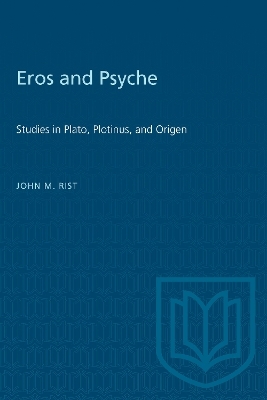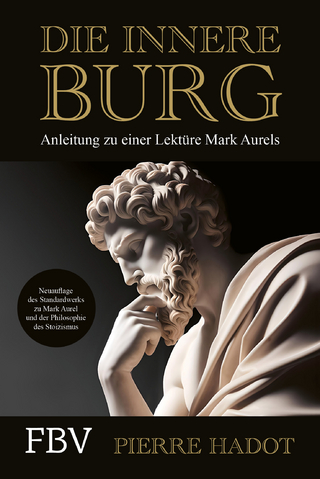
Eros and Psyche
Studies in Plato, Plotinus, and Origen
Seiten
1964
University of Toronto Press (Verlag)
978-1-4875-8515-0 (ISBN)
University of Toronto Press (Verlag)
978-1-4875-8515-0 (ISBN)
- Lieferbar (Termin unbekannt)
- Versandkostenfrei innerhalb Deutschlands
- Auch auf Rechnung
- Verfügbarkeit in der Filiale vor Ort prüfen
- Artikel merken
This study makes a substantial contribution to our understanding of the development of ancient Platonism and of the influence of Greek philosophy on Christian thought. The author examines a number of themes such as Eros, Virtue, and Knowledge in the writings of Plato.
This study makes a substantial contribution to our understanding of the development of ancient Platonism and of the influence of Greek philosophy on Christian thought. The author examines a number of themes such as Eros, Virtue, and Knowledge in the writings of Plato himself, and shows that, in our interpretation of them, we must recognize certain latent contradictions; his successors, however, attempted, not always successfully, to form a synthesis of Platonic theory based on the genuinely Platonic motif of the attaining of likeness to God.
The author skilfully demonstrates that Plato’s thought contained within itself unresolved, but philosophically fruitful divergences of opinion on the highest topics; the Good, the nature of love, the aim of the life of virtue. The author suggests that the unity of Plato’s thought consists only in certain general beliefs, such as that there are supra-sensible realities and that some aspect of the human soul is immortal. He protests, in passing, against those who look on Plato as the author of a series of tracts; one on the Theory of Forms, one on Aesthetics, another on Statesmanship, and so on.
Many of Plato’s successors, including Plotinus and Origen, assumed that they could “explain” or “correct” his “system” as though it were a compact and unified whole. Accordingly, they took parts of that supposed system out of context and welded them into their own theories. In doing so, by the very production of a system that was seldom self-contradictory and indistinct in detail, they were unplatonic even when expounding parts of the Platonic corpus. This study is thus an important contribution to Plotinian studies and it throws a fresh light on the works of Origen. To understand in particular instances the way Plotinus and Origen handled the Platonic originals and developed Platonic themes is a major object of this book.
Written with clarity, vigour, and considerable dialectical skill, the book will interest not only professional classicists and those theological thinkers who value and attempt to understand the effect of Platonism on Christianity, but also other readers who are aware of the continual importance of the Platonic tradition in Western modes of thought.
This study makes a substantial contribution to our understanding of the development of ancient Platonism and of the influence of Greek philosophy on Christian thought. The author examines a number of themes such as Eros, Virtue, and Knowledge in the writings of Plato himself, and shows that, in our interpretation of them, we must recognize certain latent contradictions; his successors, however, attempted, not always successfully, to form a synthesis of Platonic theory based on the genuinely Platonic motif of the attaining of likeness to God.
The author skilfully demonstrates that Plato’s thought contained within itself unresolved, but philosophically fruitful divergences of opinion on the highest topics; the Good, the nature of love, the aim of the life of virtue. The author suggests that the unity of Plato’s thought consists only in certain general beliefs, such as that there are supra-sensible realities and that some aspect of the human soul is immortal. He protests, in passing, against those who look on Plato as the author of a series of tracts; one on the Theory of Forms, one on Aesthetics, another on Statesmanship, and so on.
Many of Plato’s successors, including Plotinus and Origen, assumed that they could “explain” or “correct” his “system” as though it were a compact and unified whole. Accordingly, they took parts of that supposed system out of context and welded them into their own theories. In doing so, by the very production of a system that was seldom self-contradictory and indistinct in detail, they were unplatonic even when expounding parts of the Platonic corpus. This study is thus an important contribution to Plotinian studies and it throws a fresh light on the works of Origen. To understand in particular instances the way Plotinus and Origen handled the Platonic originals and developed Platonic themes is a major object of this book.
Written with clarity, vigour, and considerable dialectical skill, the book will interest not only professional classicists and those theological thinkers who value and attempt to understand the effect of Platonism on Christianity, but also other readers who are aware of the continual importance of the Platonic tradition in Western modes of thought.
JOHN M. RIST was educated at Trinity College, Cambridge University, and is now Assistant Professor of Greek at University College, University of Toronto.
| Erscheinungsdatum | 16.05.2023 |
|---|---|
| Reihe/Serie | Heritage |
| Verlagsort | Toronto |
| Sprache | englisch |
| Maße | 152 x 229 mm |
| Gewicht | 380 g |
| Themenwelt | Geisteswissenschaften ► Philosophie ► Philosophie Altertum / Antike |
| Geisteswissenschaften ► Religion / Theologie | |
| Geisteswissenschaften ► Sprach- / Literaturwissenschaft ► Anglistik / Amerikanistik | |
| Geisteswissenschaften ► Sprach- / Literaturwissenschaft ► Literaturwissenschaft | |
| ISBN-10 | 1-4875-8515-2 / 1487585152 |
| ISBN-13 | 978-1-4875-8515-0 / 9781487585150 |
| Zustand | Neuware |
| Informationen gemäß Produktsicherheitsverordnung (GPSR) | |
| Haben Sie eine Frage zum Produkt? |
Mehr entdecken
aus dem Bereich
aus dem Bereich
Anleitung zu einer Lektüre Mark Aurels
Buch | Hardcover (2025)
FinanzBuch Verlag
20,00 €
mit Sokrates, Seneca, Platon & Co. im Gespräch
Buch | Hardcover (2023)
FinanzBuch Verlag
18,00 €


